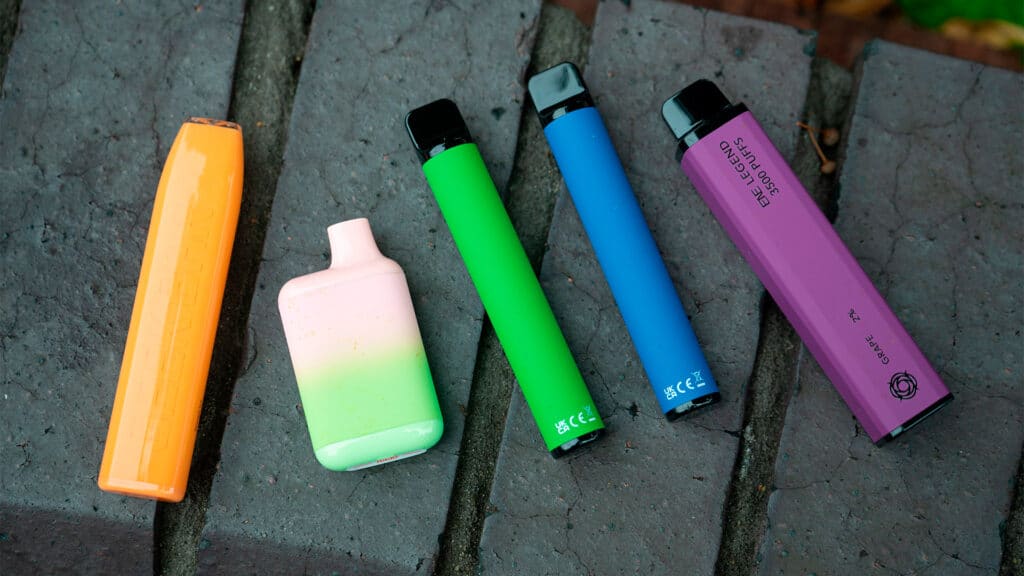One year after banning vapes, Kazakhstan still sees them flooding the black market

On April 19, 2024, Kazakhstan effectively banned the sale, production and distribution of electronic cigarettes and vapes. To ensure compliance with the law, authorities introduced high fines and serious penalties — up to five years in prison with property seizure by the government — for violations.
Kursiv.media decided to find out whether it’s still possible to buy a prohibited product, and discovered a full-fledged black market for vapes in the country. For those selling these products, there seem to be no legal barriers they can’t overcome.
What has changed over the year
«I try to save my vape for special occasions because they no longer sell liquid nicotine,» said an elderly man, who used to smoke his homemade vape. He has been using a pod system to heat tobacco instead for the past year.
Commenting on the ban, the man said he is unhappy with it, claiming that the homemade device he used wasn’t as harmful as store-bought ones, since he made the liquid «without any flavorings» himself.
«This mafia is the one to blame,» he said, referring to the device he held. «They claim that it is not harmful, but there is no difference in composition. Otherwise, it just won’t smoke. This is nothing more than a scam of the people,» he emphasized, noting that he doesn’t want to smoke regular cigarettes because of their bad smell.
It wouldn’t be fair not to mention MP Mukash Inskandirov, who opposed banning vapes back in 2023. At the time, he argued that cracking down on these devices would not solve the problem — it would only create another black market. His opinion hasn’t changed over the past two years.
«I was against the ban because I genuinely believed that strict regulation would be more effective. For example, neighboring Russia recently dropped the idea of banning vapes after realizing that this would drive the market underground with zero positive outcomes. Bans often go hand in hand with corruption. Almost all restrictions can be circumvented or resolved on a personal level. This is what usually happens in real life, and we can see it now. It’s no secret that there are many ways to buy vapes. If you want one, you can easily get it. As far as I’m concerned, the only effect we got is that vape prices have simply increased,» he said.
«Buying a vape on Telegram is as easy as ordering food»
According to the Prosecutor General’s Office, 115 people were prosecuted for illegal trafficking of vape devices and related products (Article 301-1 of the Criminal Code of the Republic of Kazakhstan) in 2024. In the first quarter of 2025 alone, this number reached 97.
Earlier this month, Kursiv.media ordered a vape through a «verified» Telegram channel as an experiment. The seller promptly sent a price list, asking for a preferred flavor and address. The order was delivered straight to the office in 30 minutes. The payment method was cashless via Kaspi; delivery was «hand to hand» for $32.50, including shipping.
For extra-cautious buyers, vape sellers offer drop-off delivery methods similar to those used in the drug trade. Some simply leave a delivery in a mailbox or disguise it as another product. Given that this method minimizes risks for couriers, more sellers are switching to it.
«Sometimes they just leave a bag with a brand-new vape on your doorknob. On one occasion, my vape — packed in a branded plastic bag — was buried in a flowerbed near my building entrance. I got a picture with directions. Everything is sold and bought almost the same way as before. These bans are useless,» said a regular customer of the Telegram channel.
Tobacco associations also point to a disturbing trend: the ban on vape devices has failed to reduce the number of smokers in the country. In fact, it has stimulated illicit trafficking of both vape devices and traditional cigarettes.
According to Dmitry Zhukov, executive director of the QazSpirits association, before the ban, there was a gradual shift from traditional cigarettes to vapes as a less harmful and more convenient alternative. That trend is now gone, and people are returning to cigarettes, often using products sold illegally.
«We said this before the ban. The vape market wouldn’t disappear — it would just go underground. We sent letters to MPs warning them that it’s impossible to close an entire market overnight. It would spark a surge in uncontrolled trafficking of DIY devices made from plastic casings, heating elements and illegal nicotine liquids. No special skills or resources are needed to produce them. You can’t control this,» Zhukov emphasized.
Protecting schoolchildren or another useless ban?
MP Nurgul Tau disagrees with claims that the ban is useless. She believes the measures undertaken by the government have already shown results, particularly in limiting access to vapes for minors.
The MP argued that before the ban, vapes were easily accessible — even minors could purchase them for about $4.75.
«In conjunction with the Ministry of Internal Affairs, we’ve done a lot — and we’re still doing this work. We even conducted secret shopper campaigns, buying vapes and reporting violations. This has yielded good results. People used to see such shops on every corner. Now, almost all of them are closed. Even the advertising has disappeared,» she said.
Tau acknowledged that the main problem now is the sale of vapes via Telegram. Authorities are encouraging young people to report illegal sellers.
«This approach works. I receive five to six links to such Telegram channels daily. Most are small channels with maybe 24 subscribers, but last month we identified one with 37,000 followers. The Interior Ministry responds in every case, but the problem is like a fungus — no matter how strong your punch, it reappears in a new form. Still, the control mechanism is now debugged, and the necessary bylaw changes have been made,» Tau added.
She also pointed out that the current law does not prohibit possession of vapes, which illegal sellers exploit. Authorities plan to close this loophole soon.
«I found a vape disguised as a children’s toy in Almaty myself. It’s obvious to me that it wasn’t meant for adults but for kids. The device had a banana ice flavor. If your child uses such a vape, you wouldn’t even realize they’ve smoked. What’s worse is the nicotine content. Even though the label said 5%, lab tests showed it contained 12% nicotine. Just imagine what that does to a child’s lungs over time,» she said indignantly.
Another MP, Elnur Beisenbaev, also believes the ban has had a positive impact, particularly in protecting children.
«Don’t forget the problem we were dealing with. Vapes were popular among sixth- and seventh-graders. Parents often found them in their kids’ backpacks. That’s no longer the case. These devices are now rarely seen among children. That was our key motive,» he explained.
Who advocated for the ban on vapes in Kazakhstan?
Beisenbaev also responded to accusations that the ban was driven by tobacco company interests. He noted that tobacco is a licensed and tightly regulated industry, unlike the vape market.
«We tried multiple times to bring this market under control but failed. At the biggest marketplace in Almaty, vapes were sold in bulk for under a dollar. No one could even say what kind of oil was in them. It was madness. Vape sellers will keep claiming this was all about tobacco lobbying but for us legislators, there’s no point in lobbying anything. For me, tobacco and vapes are the same evil. I don’t smoke myself — all that stuff is irrelevant to me,» the MP said.
Ban or regulation: What happens next?
According to MP Aidos Sarym, although the ban’s supporters had good intentions, the decision created more problems than it solved. He said he was against the ban from the start.
«Sometimes the government has to respond to public demand. This topic was popular. I mean, I’ve seen sociological reports and I am aware that public support for the ban was huge. But for us legislators, this is a good lesson: not everything popular on social media should become law,» he noted.
Sarym is convinced the ban hasn’t been as effective as hoped because vapes don’t generate the same public outrage as drugs. Without widespread condemnation or complaints, violators face less pressure.
«Maybe over time we’ll find a reasonable compromise between strict laws and the perspectives of parents, kids and society. To make smoking unpleasant for children, it needs to become unpopular. For example, we could encourage girls not to be friends with boys who smoke and vice versa,» he said.
Beisenbaev, in contrast, remains firm in his belief that the ban on vapes was justified and should not be revised. He acknowledged that some experts advocate legalizing vapes and regulating the market but said there is still no clear proposal.
«This is the government’s jurisdiction. It should study international best practices and define the rules. So far, there’s nothing — no proposals, no discussions. In my view, this is an executive matter. If they come up with new arguments and ideas, we MPs are always open to dialogue,» he said.
In turn, Iskandirov said the government and parliament will eventually revisit the issue and may abandon the ban in favor of market regulation.
«Let’s wait and see. I’ve been to many Western countries. Vapes are widely available there, but expensive. If someone wants to smoke them, fine — but it should cost more. We suggest raising prices so that sellers only offer certified products. I think we’ll reconsider the issue. But, as usual, everyone’s waiting for the first high-profile case,» the MP said.
Opponents of the vape ban in Kazakhstan have submitted petitions twice. The first, in 2023, garnered more than 100,000 signatures but was ignored by the government. A second petition, launched on ePetition.kz in May 2024, collected about 1,000 signatures in 10 days. Since the voting page is currently unavailable, it’s unclear how many people have signed it so far.

